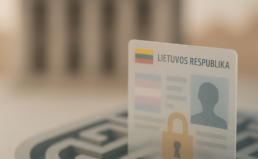On May 24th, 2017 the working group on legal gender recognition of the Ministry of Justice of the Republic of Lithuania concluded its first official meeting. The working group includes Tomas Vytautas Raskevičius, the Policy Coordinator (Human Rights) of the National LGBT* Rights Organization LGL.
The working group is preparing a draft bill with the aim of regulating administrative procedures that would allow transgender people to change their identity documents in order to reflect their gender identity. The draft bill would also enable Lithuania to implement the judgement of the European Court of Human Rights (ECHR) of September 11th, 2007, in L. v. Lithuania case, which found Lithuania to be in breach of the Article 8 of the Convention for the Protection of Human Rights and Fundamental Freedoms that guarantees the right to respect of private and family life.
“In order to represent the interests of transgender community, I will seek for the establishment of a procedure in line with the international standards of human rights, which would allow transgender people to change their identity documents quickly and accessibly, without any unnecessary requirements (e.g. mandatory surgical treatment)”, commented Tomas Vytautas Raskevičius, Policy Coordinator (Human Rights) of LGL.
The working group is led by Paulius Griciūnas, Vice Minister of Justice. Its members include representatives of the Ministry of Justice and the Ministry of Health, Human Rights Monitoring Institute, National LGBT* Rights Organization LGL, Lithuania’s representative to the European Court of Human Rights (ECHR) and legal experts. The working group is planning to prepare the draft bill seeking to regulate legal gender recognition until September 1st , 2017.
The case L. v. Lithuania
In judgement in the case L. v. Lithuania by the European Court of Human Rights (ECHR) ruled that “the circumstances of the case reveal a legislative gap in regulation of gender reassignment procedure, which leaves the applicant in a situation of distressing uncertainty vis-à-vis his private life and the recognition of his true identity.” The Court obligated the Government of the Republic of Lithuania to adopt gender reassignment legislation within three months of the judgment. The applicant was represented in the Court by the Human Rights Monitoring Institute.
After the Court’s decision came into force, Lithuania paid the applicant for pecuniary and non-pecuniary damages, but did not adopt the required legislation. In 2014, due to the Lithuanian Government’s failure to fulfill the Court’s decision, the Council of Europe’s Committee of Ministers transferred the case to the enhanced supervision procedure. From 2013, the Human Rights Monitoring Institute and the National LGBT* Rights Organization LGL is carrying out monitoring and advocacy activities related to the implementation of Court’s decision.
You can learn more about these activities here.
LGL’s activities in representing the interests of transgender community
Effective protection of the rights of transgender individuals is one of the priorities for the National LGBT* Rights Organization LGL. The association LGL is seeking that transgender people in Lithuania could change their identity documents without the requirement of mandatory surgical treatment and could have access to appropriate health services. In order to achieve change at institutional level, the association LGL is also seeking to build the local transgender community and empower its members to participate in the work of the organization.
The work of the National LGBT* Rights Organization LGL in protection of the rights of transgender people is supported by international partners: – TGEU – Transgender Europe and Stiftung EVZ (Germany).

More information about the situation of transgender people in Lithuania can be found in LGL’s publications:
#TRANS_LT: Documenting Experiences of Transgender People in Employment, 2016




